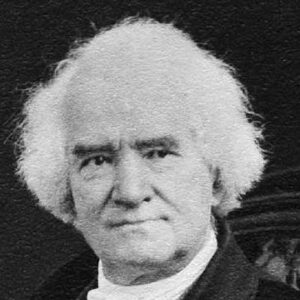George M. Dallas was an American politician who served as the eleventh Vice President of the United States from 1845 to 1849 under President James K. Polk’s Democratic administration. Dallas, born in Philadelphia to a political family, studied law and was admitted to the bar after graduating from the College of New Jersey. After serving as Albert Gallatin’s private secretary during his diplomatic tour of Russia, he returned to New York City a year later to begin his law career. Later, he moved toward politics, was appointed mayor of Philadelphia, and then became U.S. district attorney for the eastern district of Pennsylvania. Dallas was elected to the United States Senate as a Democrat in 1831 and served until 1833. Subsequently, he was named Pennsylvania’s attorney general and eventually served as Russia’s minister until 1839, when he voluntarily resigned. Dallas was elected Vice President of the United States in 1844 on the Democratic ticket under the administration of James K. Polk, serving from March 1845 to March 1849. After completing his sole tenure as vice president, he served between 1856 and 1861 as minister to Great Britain. At the conclusion of his diplomatic career, Dallas returned to his birthplace, where he later died of a heart attack. As a monument to Dallas, the Texas and Oregon cities of Dallas are named after him.
Youth and Early Life
George Mifflin Dallas was born in Philadelphia, Pennsylvania, the United States on 10 July 1792 to parents Alexander James Dallas and Arabella Smith Dallas. He was the second of his parents’ six children. His father served as Secretary of the Treasury under President James Madison of the United States.
He attended Quaker-run preparatory institutions for his early education before enrolling at the College of New Jersey. In 1810, he graduated with the greatest honors and then chose to study law. Dallas was admitted to the Pennsylvania bar in 1813.
George Dallas’s Career
In 1813, the same year he was called to the law, Dallas joined Treasury Secretary Albert Gallatin on a diplomatic mission to Russia as Gallatin’s private secretary. The pair traveled to negotiate the end of the War of 1812 and returned to the United States in 1814.
Dallas began practicing law in New York upon his return and ultimately became counsel for the Second Bank of the United States. He was named deputy attorney general of Philadelphia in 1817 and retained the position until 1820.
Dallas was elected mayor of Philadelphia in October 1828 and served in that role until April 1829. President Andrew Jackson subsequently appointed him as United States attorney for the eastern district of Pennsylvania, a position he held until 1831.
From 1831 to 1833, he represented Pennsylvania in the United States Senate as a Democrat. Dallas served as chairman of the Committee on Naval Affairs for fewer than fifteen months before declining reelection.
After resuming his legal career, Dallas was appointed Pennsylvania’s attorney general in 1833 and served in that capacity until 1835. In 1835, he also served as the Grand Master of Pennsylvania’s Freemasons.
Dallas was named Envoy Extraordinary and Minister Plenipotentiary to Russia by President Van Buren in 1837. He remained in this position until 1839 when he voluntarily resigned. Throughout the subsequent years, his relationship with James Buchanan remained strained, as both men participated in a protracted war for party leadership in Pennsylvania.
For many years, Dallas and Buchanan were opposing Democratic Party leaders in Pennsylvania. Dallas was offered the position of U.S. attorney-general in 1839 after Buchanan declined it, but he declined and spent the subsequent years practicing law in Philadelphia.
In May 1844, following the nomination of James Polk for president and Silas Wright’s refusal to run for vice president, the Democratic Party offered Dallas the vice presidency. Consequently, he was nominated for Vice President of the United States on the Democratic ticket, with Polk as the presidential candidate.
In March 1845, Dallas took the oath of office as Vice President of the United States after being properly elected. From 1845 to 1849, he served as Vice President with authority, but after Buchanan’s appointment as secretary of state, Dallas lost any prospect of party support and influence in the Polk administration.
In 1856, President Franklin Pierce appointed him Envoy Extraordinary and Minister Plenipotentiary to the United Kingdom, a position he held until 1861.
Dallas’s Major Opera
As Vice President of the United States, he diligently pursued the lowering of tariffs and territorial expansion. Dallas established the first local trade station in Texas, which was the first known settlement in the current Dallas, Texas, metropolitan region. As the British Minister, he represented his country with discretion and made every effort to advance the Union’s cause in the United Kingdom.
Personal History and Legacy
In 1816, George Dallas wed Sophia Chew Nicklin, a descendant of a prominent Federalist dynasty. The couple produced eight children.
After retiring from politics, Dallas went to Philadelphia to live a private life and died of a heart attack at the age of 72 on December 31, 1864. He was laid to rest in the cemetery of St. Peter’s Episcopal Church in Philadelphia, Pennsylvania, United States.
Estimated Net Worth
George is one of the wealthiest and most popular politicians in the world. According to our investigation, Wikipedia, Forbes, and Business Insider, George M. Dallas has an estimated net worth of $1.5 million.


